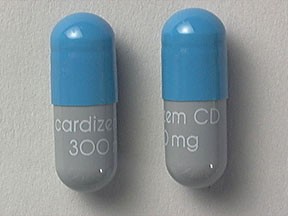
diltiazem 24-hour sustained-action capsule – oral, Cardizem CD
Medication Uses: Diltiazem is used to treat high blood pressure (hypertension) and prevent chest pain (angina). Lowering high blood pressure helps prevent strokes, heart attacks, and kidney problems. Diltiazem is a calcium channel blocker that relaxes blood vessels, allowing blood to flow more easily and lowering heart rate. It may also be used to control a fast/irregular heartbeat called atrial fibrillation.
How to Use: Take this medication by mouth with or without food, usually once daily or as directed by your doctor. Swallow the capsules whole. Do not crush or chew them, as this can increase your risk of side effects. Your doctor will gradually increase your dose based on your medical condition and response to treatment. Remember to take it at the same time each day. Even if you feel well, continue taking the medication. It may take 2 to 4 weeks to see the full benefit for high blood pressure. Do not use this medication to treat angina when it occurs; use other medications as directed by your doctor.
Side Effects: Common side effects include dizziness, lightheadedness, weakness, nausea, flushing, constipation, and headache. If these persist or worsen, notify your doctor. Serious but rare side effects include fainting, irregular heartbeat, swelling, shortness of breath, unexplained weight gain, mental/mood changes, and severe stomach pain. Seek immediate medical attention if you have an allergic reaction or rare but serious side effects such as dark urine or yellowing of the eyes/skin.
Precautions: Before taking diltiazem, tell your doctor if you have allergies or certain medical conditions. Avoid driving or using machinery until you know how the medication affects you. Inform your doctor if you plan to have surgery. Older adults may be more sensitive to the side effects. Only use this medication during pregnancy or while breastfeeding if clearly needed. Consult your doctor before breast-feeding.
Drug Interactions: Inform your doctor or pharmacist about all prescription and non-prescription/herbal products you are using, as they may interact with diltiazem. Some common drug interactions include amiodarone, digoxin, and fingolimod. Check the labels of all your medicines, as some may contain ingredients that increase your blood pressure or heart rate. Cimetidine, a common non-prescription drug for extra stomach acid, may interact with diltiazem. Consult your pharmacist for alternatives.
Images
Overdose: If overdose is suspected, contact a poison control center or emergency room immediately.
Notes: Do not share this medication with others. Talk to your doctor about lifestyle changes that may improve its effectiveness, such as stress reduction, exercise, and dietary changes. Regularly monitor your blood pressure and pulse. If you miss a dose, take it as soon as you remember. Store the medication properly and dispose of it correctly.
Report Problems to the Food and Drug Administration
Report negative side effects of prescription drugs to the FDA at their MedWatch website or call 1-800-FDA-1088.
Conditions of use: This information is intended to supplement the expertise and judgment of healthcare professionals. It is not a substitute for their advice. Consult a healthcare professional before taking any drug or changing diet or treatment.


